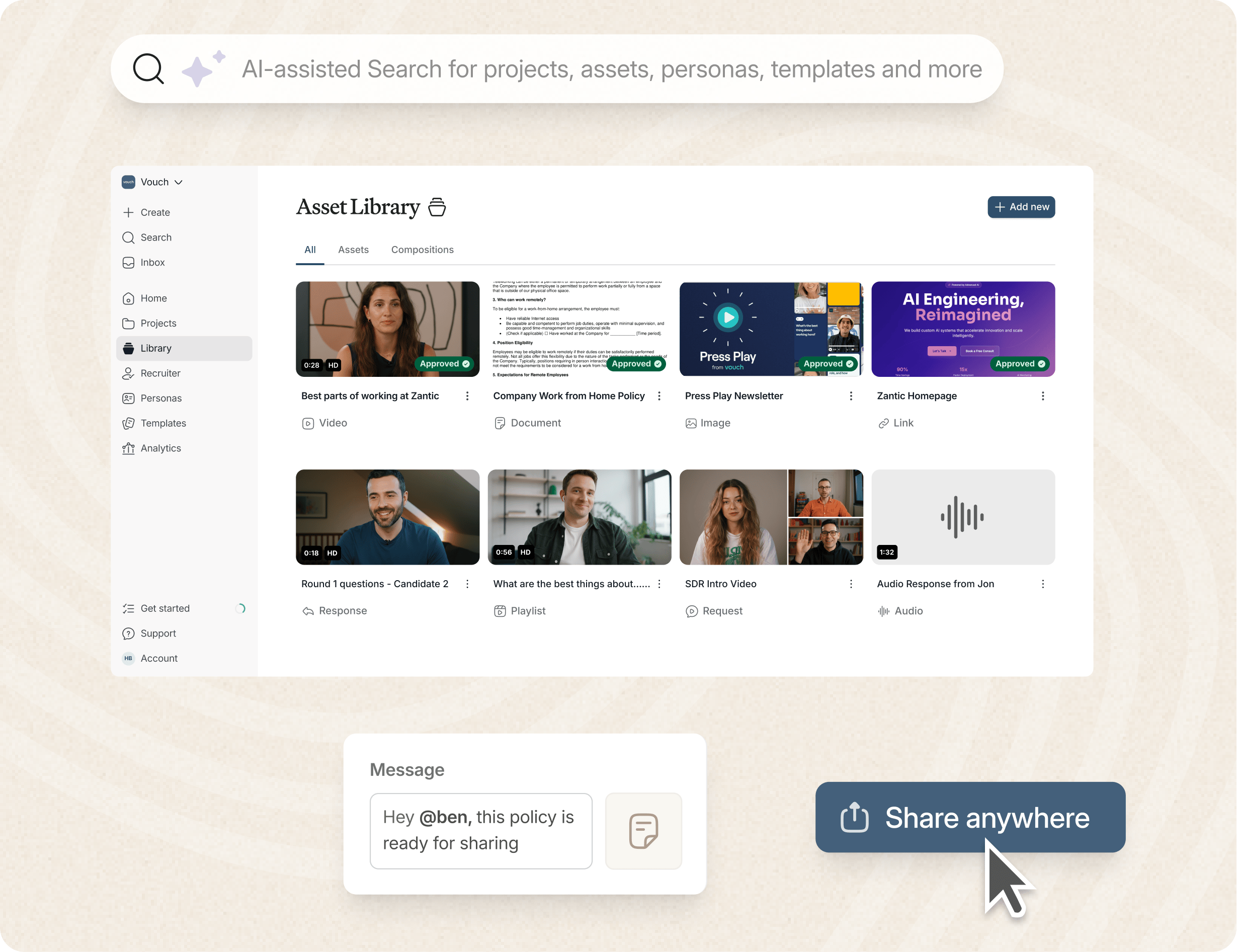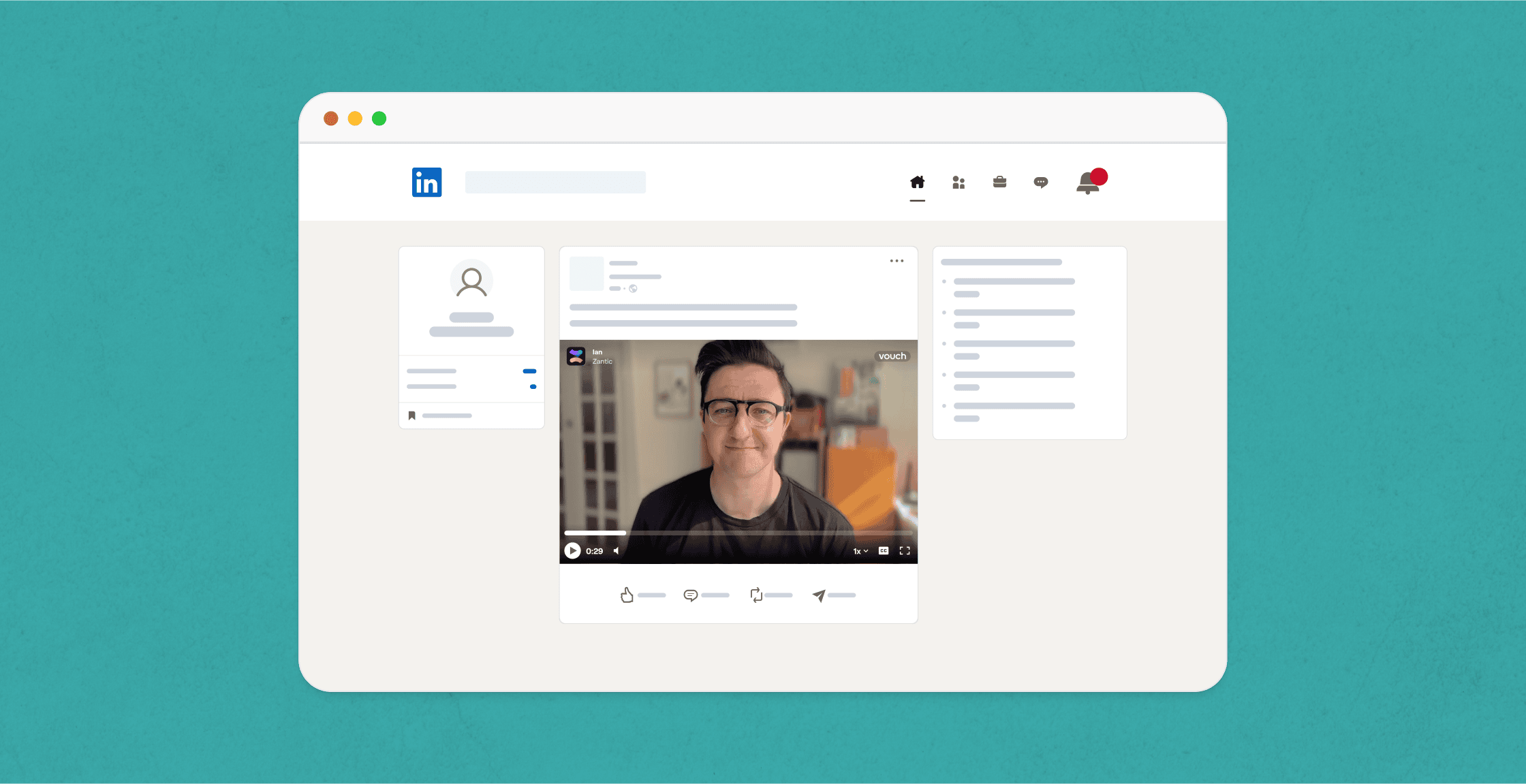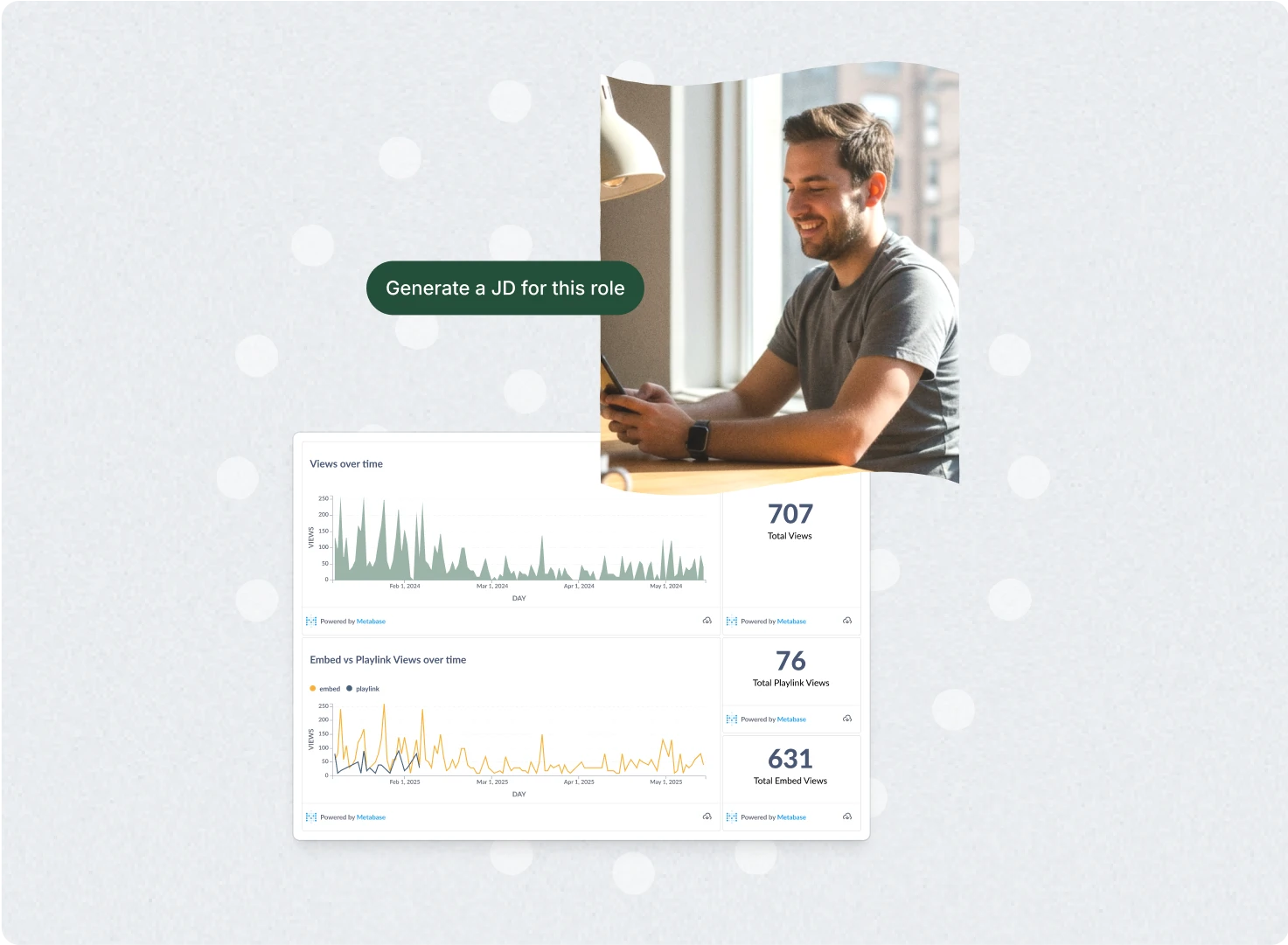Do you have a passion for helping people land their perfect jobs?
If so, you are likely the right person and the ideal employment specialist.
An employment specialist is a professional dedicated to connecting job seekers with employers, either in-house or through an external agency.
After all, according to LinkedIn, 87% of recruitment pros say Talent Acquisition has become a more strategic function over the past year, and employment specialists, especially in some of the world's best companies, work directly with TAs.
So, let's dive deeper into the interesting world of employment specialists and explore how leading companies and employment specialists also use innovative tools like Vouch to enhance recruitment, help attract the ideal candidates for open positions, and even build their employer brand.
Let's get started.
Why is Understanding an Employment Specialist's Role Important?
Understanding an employment specialist's job description and role is crucial for companies and specialists alike.
These professionals act as a bridge between job seekers and employers, ensuring the right match for both parties.
With their expertise, employment specialists also streamline the hiring process, saving you time and effort - and the company you work for. This includes producing engaging video content that showcases job opportunities and your employer's workplace culture, making the recruitment process more interactive and efficient.
The AI-enabled workspace for talent teams.
- Unified workspace for talent teams
- Accelerate hiring with AI tools
- Auto-generate polished hiring and employer brand content
- Easily repurpose assets across all channel

What Tasks are Common in an Employment Specialist's Daily Routine?
An employment specialist's day is filled with various tasks that aim to connect job seekers with the right employers. Here are some of their typical daily activities:
- Conducting background checks to verify candidate information.
- Coordinating mock interviews to prepare candidates for actual job interviews.
- Matching job applicants with suitable job openings.
- Providing training to job candidates to improve their job-related skills.
- Facilitating job development by identifying new employment opportunities.
- Utilizing tools like Vouch to create engaging video content for candidate interviews and employer branding.
How Do Employment Specialists Help with Job Placement?
When browsing an employment specialist job description, you'll see that employment specialists play a critical role in job placement by performing the following tasks:
- Screening candidates to ensure they meet job requirements.
- Conducting tests on candidates to assess their skills and suitability.
- Providing training, including video sessions, to enhance transferable skills.
- Facilitating candidate travel for interviews and job fairs.
- Coaching candidates on interview preparation and mock interviews.
- Collaborating with employers to align employment goals with company needs.
What Soft Skills are Crucial for Success in This Role?
To excel as an employment specialist, you need a variety of soft skills.
These include excellent communication skills to effectively interact with job seekers and employers and strong interpersonal skills to build relationships and trust.
Organizational skills are also essential to help you manage multiple candidates and job openings efficiently. And then, customer service orientation is crucial to support job seekers throughout the employment process.
You'll also need problem-solving abilities to overcome employment barriers and find solutions, so needless to say, many soft skills are required.
What Technical Skills Should an Employment Specialist Possess?
When browsing an employment specialist job description, you might see a number of technical skills that are unique to the role. However, in general, an employment specialist should have the following technical skills:
- Knowledge of background check requirements and procedures.
- Ability to perform task analysis to match job applicants with suitable roles.
- Familiarity with employment verifications and record-keeping.
- Experience with employee database management and accurate record maintenance.
- Proficiency in using recruitment tools like Vouch to create video content.
What Educational Background Does An Employment Specialist Require?
Employment specialists typically need a solid educational foundation. This often includes:
- A bachelor's degree in Social Work, Human Resources, or a related field.
- Knowledge acquired through an academic program focusing on employment services.
- Additional education in specialized fields like vocational rehabilitation or business.
What Software Tools Do Employment Specialists Use?
A suitable employment specialist job description should list the tools you will need to use, and employment specialists use a variety of software tools to enhance their efficiency and effectiveness. These tools include:
- Applicant Tracking Systems (ATS): Software like Taleo and Workday help manage job postings, applications, and candidate information.
- Customer Relationship Management (CRM): Systems like Salesforce facilitate managing relationships with employers and job seekers.
- Video Interviewing Tools: Platforms like Vouch enable efficient remote interviewing and recruitment.
- Job Boards and Aggregators: Tools like Indeed, Facebook, Instagram, LinkedIn, and Twitter are used to post jobs and source candidates.
- Project Management Software: Tools like Trello and Asana help organize tasks and track progress.
- Human Resources Information Systems (HRIS): Software like BambooHR assists in managing employee data and HR processes.
These tools help employment specialists streamline recruitment, maintain detailed records, and enhance communication with stakeholders.
How Does AI Help Employment Specialists?
We touched on the common tools above, which are now mostly bringing AI features to help speed up workflows and accuracy, but let's expand on this a bit.
AI is changing the game for most industries. In recruitment, AI is now assisting employment specialists in numerous ways, enhancing efficiency and accuracy across various tasks.
Here are a few key benefits:
- Resume Screening: AI-powered tools like ATS (Applicant Tracking Systems) can quickly scan and filter resumes based on specific criteria, saving time and ensuring only qualified candidates are considered.
- Predictive Analytics: AI can analyze data to predict job market trends, helping specialists advise candidates and employers more effectively.
- Chatbots and Virtual Assistants: These tools provide immediate responses to candidate inquiries, schedule interviews, and handle repetitive tasks, freeing up specialists for more complex activities.
- Skill Matching: AI can match candidate skills with job requirements more accurately by analyzing various data points, including past experiences, certifications, and job descriptions.
- Bias Reduction: AI can help reduce unconscious bias in the hiring process by focusing on data-driven insights rather than subjective judgment.
- Video Interview Analysis: Tools like Vouch use AI to help edit your videos and speed up the recruitment process, including streamlining video interview answers.
By integrating these AI tools, employment specialists can improve their recruitment process, enhance candidate experiences, and achieve better job placements.
What Is The Average Wage For An Employment Specialist?
According to PayScale, the average wage in the United States in 2026 for an employment specialist job description is approximately $18.02 per hour. This translates to an annual salary range between $30,000 and $52,000, depending on experience, location, and additional compensation such as bonuses and profit sharing.
Entry-level positions start around $16.37 per hour, while experienced professionals can earn upwards of $23.61 per hour. Employment Specialists play a crucial role in matching candidates with suitable job positions and ensuring a good fit for both the employee and the company.
Are There Specific Certifications or Training Programs for Employment Specialists?
To become an employment specialist, specific certifications and training programs can significantly enhance your qualifications.
Typical certifications include the Certified Employment Support Professional (CESP) and training programs from the Association of Community Rehabilitation Educators (ACRE).
These certifications validate your expertise in employment services and support for individuals with disabilities.
Additionally, ongoing professional development through workshops, seminars, and online courses on LMS platforms in areas such as vocational rehabilitation, job development, and human resources can be beneficial. Leading companies also leverage internal training tools like Vouch for video-based training to help experts further enhance their skills in this field.
What Benefits Do Job Seekers Gain from Working with Employment Specialists?
Suppose you are looking to advertise an employment specialist job description and role. In that case, you should know that it's not just the companies that benefit from these experts, but job seekers themselves, as they gain support and advice from employment specialists, including:
- Personalized coaching on interview preparation and mock interviews.
- Guidance on developing job-related skills and transferable skills.
- Support in overcoming employment barriers and achieving employment goals.
What Common Obstacles Might an Employment Specialist Encounter?
As an employment specialist, you will always encounter a few obstacles. One significant challenge is managing the expectations of both job seekers and employers, ensuring a match that satisfies both parties - this is by far one of the biggest challenges.
Then, you will need to be able to navigate employment barriers such as lack of experience, skill gaps, or personal issues of candidates, which can be difficult. Additionally, staying updated with constantly changing job market trends and employer requirements is essential but demanding.
Then, like most HR roles, handling high caseloads and maintaining detailed documentation can also be time-consuming and stressful - and this is where you need to be able to lean on your team and technology to keep you on track.
How Can You Pursue a Career as an Employment Specialist?
As an exciting and growing field, landing an employment specialist role can be life-changing. A good employment specialist job description should list all of the requirements, but we should expand by saying that HR-based roles are also some of the hardest to replace with AI—as finding the right people requires people.
There are a number of paths that employment specialists can take to pursue their careers, but if you are entirely new to the field, here is a quick guide:
- Obtain a relevant degree in Social Work, Human Resources, or a related field.
- Gain experience through internships or entry-level positions in employment services.
- Acquire certifications from organizations like the Association of Community Rehabilitation Education.
- Develop strong communication skills, organizational skills, and interpersonal skills, and use these to reach out to Talent Acquisition and HR managers to see if they need help in their recruitment departments, or, of course, reach out to a recruitment agency where many employment specialists work.
FAQs
What is an employment specialist?
An employment specialist connects job seekers with employers, either in-house or through external agencies, ensuring the right fit for both parties.
Why is understanding an employment specialist's role important?
Understanding this role helps streamline the hiring process, save time, and produce engaging content that showcases job opportunities and workplace culture.
What tasks are shared in an employment specialist's daily routine?
When looking at an employment specialist job description, typical tasks include conducting background checks, coordinating mock interviews, matching job applicants with openings, providing training, and creating video content with tools like Vouch.
How do employment specialists help with job placement?
They screen candidates, conduct skill tests, provide training, facilitate candidate travel, coach on interviews, and collaborate with employers to align employment goals.
What soft skills are crucial for success in this role?
Critical soft skills include excellent communication, strong interpersonal abilities, organizational skills, customer service orientation, and problem-solving capabilities.
What technical skills should an employment specialist possess?
Technical skills needed include knowledge of background check procedures, task analysis, employment verifications, database management, and proficiency with recruitment tools like Vouch.
What educational background does an employment specialist require?
Typically, this position requires a bachelor's degree in Social Work, Human Resources, or a related field, along with specialized education in areas like vocational rehabilitation or business.
Conclusion
Understanding an employment specialist job description and role is vital for starting your career journey. Whether you're a job seeker or an employer, these professionals play a vital role in connecting the right talent with the right opportunities.
We hope this article has helped you take your first step toward achieving your employment goals as an employment specialist and what to look for in a suitable employment specialist job description.
Like to try Vouch?
Loved by companies like Canva, Nike, Cisco, HubSpot, Amazon, and more, tools like Vouch make leveraging video in your business remarkably easy.
Book a Vouch demo today and chat with a video content marketing expert about your business needs.
You might also like

Elevate Your Brand Today With Vouch
Discover how Vouch can accelerate talent acquisition while helping you stay on-brand.






